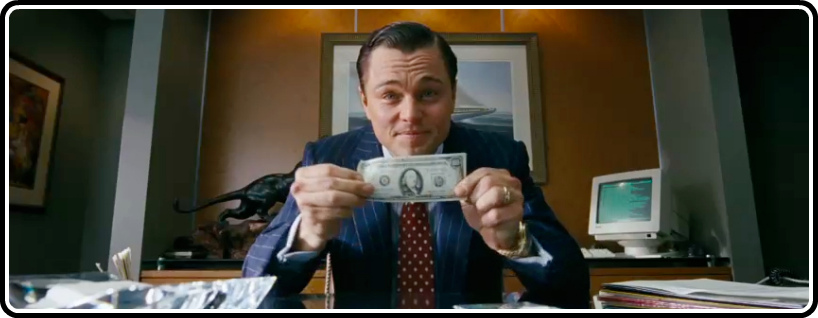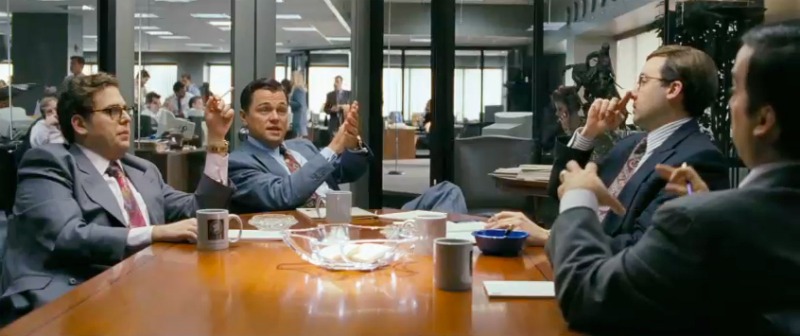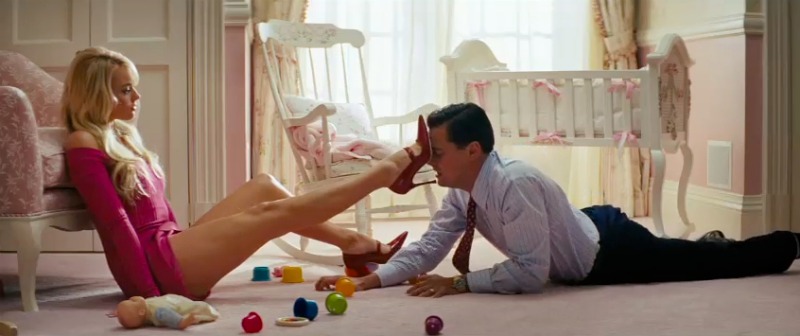
As long as there’s been a cinema, there’s been the issue of how to portray the lifestyles of the rich and criminal. Too glamorous, you risk ignoring the horror of the things they’ve done. Too repulsive and you overlook the allure that drew the characters into this line of work. Martin Scorsese is more than familiar with this schism, not only as a huge consumer of the cinema himself, but as the filmmaker behind Goodfellas, Casino, Mean Streets, and The Departed. The man knows how to make criminal activity look downright awesome, so much so that he’s often accused of glorifying violence (a charge that says more about the complainant than the defendant, if you ask me). Such charges, however, overlook the gruesomeness with which Scorsese renders such scenarios, how he recognizes that psychological charge than accompanies such acts alongside the terrible damage, physically and psychologically. With The Wolf of Wall Street, I wonder if even his critics will be able to make their case.
We’re introduced to Jordan Belfort (Leonardo DiCaprio) as a philandering, drug-addicted narcissist whose pure desire to obtain wealth blinds him to all else, including the very source of that money. It’s been said that it’s easy to make money, so long as all you want to do is make money. And boy, does Jordan want to make money. It takes a little while to find that his empire is built almost entirely on defrauding middle-class people with penny stocks that have no viable future. It’s pretty easy to tell that even for Wall Street, Jordan is a man of very low character. Gordon Gekko’s “greed is good” speech was famously distorted by an entire generation of power-hungry cretins eager to lend moral legitimacy to their capitalistic pursuits, but when Jordan says, in voiceover, that “Money doesn’t just buy you a better life…it also makes you a better person,” it’s a laugh line, impossible to accept seriously. “You can save the fucking spotted owl with money,” he concludes. Beyond DiCaprio’s arch delivery, though, the words themselves reveal the lie – you can save the spotted owl, but money doesn’t make you anything. Other than rich.

The proceeding three hours show everything you can do with money, should you decide that the owl isn’t to your taste. There’s the usual effects, from the common – the big house, the nice car, the boat, the beautiful wife – to the debased – the drugs, the hookers (who Jordan claims to see five times per week), the gambling – to the truly warped – the way in which Jordan exerts power over anyone in his path. Nowhere is it demonstrated that money made Jordan a better person. What little glimpse we get into his relatively uncorrupted life, via his first day on Wall Street, indicates, if not a purely altruistic point of view, then certainly one who recognizes the value of collective interests. His opinion on this matter is reversed almost instantly. Jordan isn’t an innovator, an entrepreneur, a visionary; he’s not even a businessman. He’s a vessel of capitalism, the purest distillation of everything that the system encourages and even mandates – to make as much money as you can, however you can, and to spend it as lavishly as you can. Any talk of “motivation” becomes fruitless. “Ever since I was young, I wanted to be rich,” he says, recounting a familiar refrain from another Scorsese film. And that’s all there is to it.
DiCaprio, as has come to be expected for this viewer, is really outstanding, driving nearly every scene of the film with an energy that’s at once wildly manic and intensely focused, not an inappropriate decision for a character who’s almost always high. He has always reflected, or even defined, the atmosphere of his collaborations with Scorsese (the stoic complacency of The Gangs of New York, the angular muscularity of The Departed, the storm of repressed emotions escaping the seams of his exterior in Shutter Island), but never quite to the extent that the actor and director have collided here. He meets Scorsese’s indulgent-yet-questioning atmosphere with a vision of Jordan’s bravado that’s totally confident without once undermining the complete absurdity of it all. At one point, he’s arguing with his wife, Naomi (Margot Robbie, meeting screenwriter Terence Winter’s description of someone “incredibly, painfully hot,” and doing some great character work along the way), while shirtless, and she takes him to task for flexing his muscles in the midst of it. “You’re just lucky to have a husband who’s in such great shape,” he replies, in a medium shot that indicates to the audience that we have, in fact, seen DiCaprio in much better shape before. I don’t know that he specifically molded himself for the role, but there’s a casual abandon of vanity in that moment that speaks to his performance as a whole. His discovery of cocaine, suggested to be in the midst of a late-night bender, is suddenly revealed to be the middle of a suburban afternoon. For all the ways in which Jordan positions himself to be the Most Awesome Man Alive, Scorsese and DiCaprio rarely let him appear that way, always finding a way to undermine his sexuality and charisma, never denying what both get for him, but suggesting to varying degrees the extremely unpleasant traits that really drive him.

I’m actually kind of shocked that such a film came out of Scorsese, who so thoroughly wrings the humanity from even his most despicable subjects. It’s not to say Jordan is entirely bereft of this, but he is in incredibly short supply. In this regard most especially, beyond the energy of the thing and its largely comic tone, the film is most closely tied to Goodfellas, which ended, essentially, with a homicidal maniac shuffled off into witness protection having learned only that it really sucks to get caught. But even that film didn’t push that tone nearly so far; nearly every second of this film is infused with that narcissistic pettiness, ramped up well past 11 in an unending parade of dancing girls, flying midgets, racism, sexism, a dozen near-death experiences, perverse sexual acts, the most insane drug sequence I think I’ve ever seen, and an entire ensemble perfectly tuned into this larger-than-life assault. It’s easy for guys like DiCaprio and Matthew McConaughey to temporarily abandon their hunk status; quite another for Jonah Hill to do the same, and go further in so doing. When Hill meets Naomi, his comment “I would let her give me AIDS” is actually the most civilized response he has, if that’s any indication. This is Scorsese at his most disgusted, outraged, and bewildered; as with Michael Bay’s Pain & Gain, he shows the characters at once as they are and as they see themselves, the endless comedic effect.
Jordan’s eventual comeuppance is about as effective a punishment as Henry Hill’s experience, but the moral implications for the audience are undeniable. Near the beginning, Jordan introduces money as the most potent drug of all; by the end, it’s corroded his life more thoroughly than anything else. Not in the usual passed-out-in-the-gutter way, sure, but look into his eyes. Look at who surrounds him, and why. Look who no longer does. Look at how his privilege makes him feel he can treat people. And ask yourself – is this who you want to be? If so, boy, does he have a seminar for you.



![Bergman Island (The Criterion Collection) [Blu-ray]](https://criterioncast.com/wp-content/uploads/2022/11/bergman-island-the-criterion-collection-blu-ray-400x496.jpg)
![This Is Not a Burial, It’s a Resurrection (The Criterion Collection) [Blu-ray]](https://criterioncast.com/wp-content/uploads/2022/11/this-is-not-a-burial-its-a-resurrection-the-criterion-collection-blu-ray-400x496.jpg)
![Lars von Trier's Europe Trilogy (The Criterion Collection) [The Element of Crime/Epidemic/Europa] [Blu-ray]](https://criterioncast.com/wp-content/uploads/2022/11/lars-von-triers-europe-trilogy-the-criterion-collection-the-element-of-400x496.jpg)
![Imitation of Life (The Criterion Collection) [Blu-ray]](https://criterioncast.com/wp-content/uploads/2022/11/imitation-of-life-the-criterion-collection-blu-ray-400x496.jpg)
![The Adventures of Baron Munchausen (The Criterion Collection) [4K UHD]](https://criterioncast.com/wp-content/uploads/2022/11/the-adventures-of-baron-munchausen-the-criterion-collection-4k-uhd-400x496.jpg)
![Cooley High [Criterion Collection] [Blu-ray] [1975]](https://criterioncast.com/wp-content/uploads/2022/11/cooley-high-criterion-collection-blu-ray-1975-400x496.jpg)